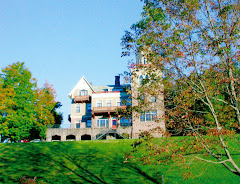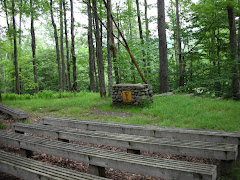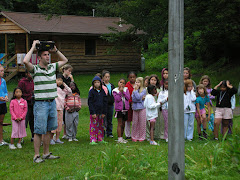 from the New York Times, November 19, 2011:
from the New York Times, November 19, 2011:Theodore J. Forstmann, a colorful financier and philanthropist who helped pioneer leveraged buyouts, died on Sunday at his home in Manhattan. He was 71.
The cause was brain cancer, his spokesman said. Mr. Forstmann had been found to have a malignant glioma earlier this year.
Mr. Forstmann was among the first executives to use debt to acquire companies, fix them and then sell them for millions — and sometimes billions — of dollars in profit.
Beginning in the late 1970s, he pooled money from wealthy investors and large pension funds to back his acquisitions while taking 20 percent of the profits, creating a business model that today is known as the private equity industry.
During the next three decades Mr. Forstmann bought, sold and turned around dozens of companies, including Gulfstream Aerospace, Dr Pepper and General Instrument.
He also coined, if inadvertently, a phrase that set the public image of the leveraged buyout industry. While he was golfing in the late 1980s with Richard L. Gelb, then the chairman of Bristol Myers, the discussion turned to a surge in takeovers by buyout firms. “What does it all mean?” Mr. Gelb asked Mr. Forstmann.
“It means the barbarians are at the gate,” Mr. Forstmann replied. “And they’ll be coming for you next.”
The phrase “barbarians at the gate” was used by Bryan Burrough and John Helyar for the title of their best-selling 1990 book about the $25 billion buyout of RJR Nabisco, which Mr. Forstmann had bid on and lost to a private equity rival, Kohlberg Kravis Roberts.
Yet as buyouts grew and more and more debt was used to finance deals, Mr. Forstmann grew more cautious about the business. In an op-ed article in The Wall Street Journal in 1988, at the height of the buyout craze, he wrote, “Watching these deals get done is like watching a herd of drunk drivers take to the highway on New Year’s Eve.”
Mr. Forstmann, who gave hundreds of millions of dollars to charity, was also among the first philanthropists to push for voucher programs for education in the 1990s, leading to the movement by financiers to promote charter schools. In 1999 he founded the Children’s Scholarship Fund with John T. Walton, the son of the Wal-Mart founder Sam Walton, to offer scholarships allowing underprivileged children to attend private schools using vouchers. He donated $50 million.
The scholarship fund has since given away $443 million to 116,000 children.
Most of Mr. Forstmann’s philanthropy centered on children. In 1992 he founded the Silver Lining Ranch, a camp for terminally ill children in Aspen, Colo., that was first run by Andrea Jaeger, the former professional tennis player.
For 25 years he held a prominent charity tennis tournament, known as “Huggy Bear,” at his summer home in Southampton, N.Y., raising over $20 million for children’s charities by bringing tennis pros like Martina Navratilova and Boris Becker to play against amateur donors.
An influential donor to Republican candidates and causes, Mr. Forstmann was co-chairman of George H. W. Bush’s re-election campaign in 1992. He named Republican allies to run the companies his firm owned, appointing Donald H. Rumsfeld as chief executive of General Instrument in 1990 and adding Colin L. Powell to the board of Gulfstream.
Unusual for a financier, Mr. Forstmann was also a regular boldface name in the gossip pages. He had a brief romantic relationship with Diana, Princess of Wales, which he said later turned into a long-term friendship.
He was often photographed arm in arm with a model or actress, including Elizabeth Hurley. (He was later the godfather of her son.) Over the last several years he dated Padma Lakshmi, the celebrity host of “Top Chef” and a model and the former wife of Salman Rushdie.
Mr. Forstmann never married and had a complicated view of the single life. In 1995 he told The Washington Post: “I find the prospect of being married more difficult than most people. I would be a difficult husband.” He added: “Maybe I’ll adopt some children. I’m not going to do nothing about this.”
Two years later Mr. Forstmann became the guardian of an orphaned child from South Africa, Everest, now 30. Mr. Forstmann was invited to South Africa in 1996 by Nelson Mandela to address the Parliament on democratic capitalism. He was so moved by the work Mr. Mandela was doing with orphaned children that he made a $1 million donation. It was on a subsequent visit to Africa to see the orphanage that he had paid for that he met Everest.
“This kid is for me, that’s it,” he recalled in an interview about the moment they met. In another visit two years later, he met another boy, Siya, who had become close to Everest. He brought them both to live with him in New York and became their guardian.
In addition to Siya and Everest, his survivors include two brothers, J. Anthony and John, and two sisters, Marina Forstmann Day and Elissa Forstmann Moran.
Theodore Joseph Forstmann, Ted or Teddy to his friends, was born on Feb. 13, 1940, and grew up in Greenwich, Conn., one of six children. He played ice hockey at Yale and put himself through Columbia Law School with proceeds from gambling on bridge.
In 1978 he started his leveraged buyout fund, Forstmann Little & Company, with his brother Nicholas and Brian Little, an investment banker. While other firms relied on the public debt markets, Forstmann Little raised its own special subordinated debt fund.
His firm had a long stretch of beating his rivals, with an annual average rate of return of over 55 percent a year on its equity funds through 2001.
But that winning streak came to an end that year when two telecommunications investments made at the height of the industry bubble, XO Communications and McLeodUSA, failed. He later said that he should not have made the investments and blamed himself for delegating investing to a younger generation enchanted by the Internet.
Over the last seven years he worked steadily on his last big investment: IMG, the sports, fashion and media company that represented the likes of Tiger Woods and Roger Federer. He bought the company in 2004 for $750 million and became its chairman.
It encompassed everything he loved: deal-making and sports.











